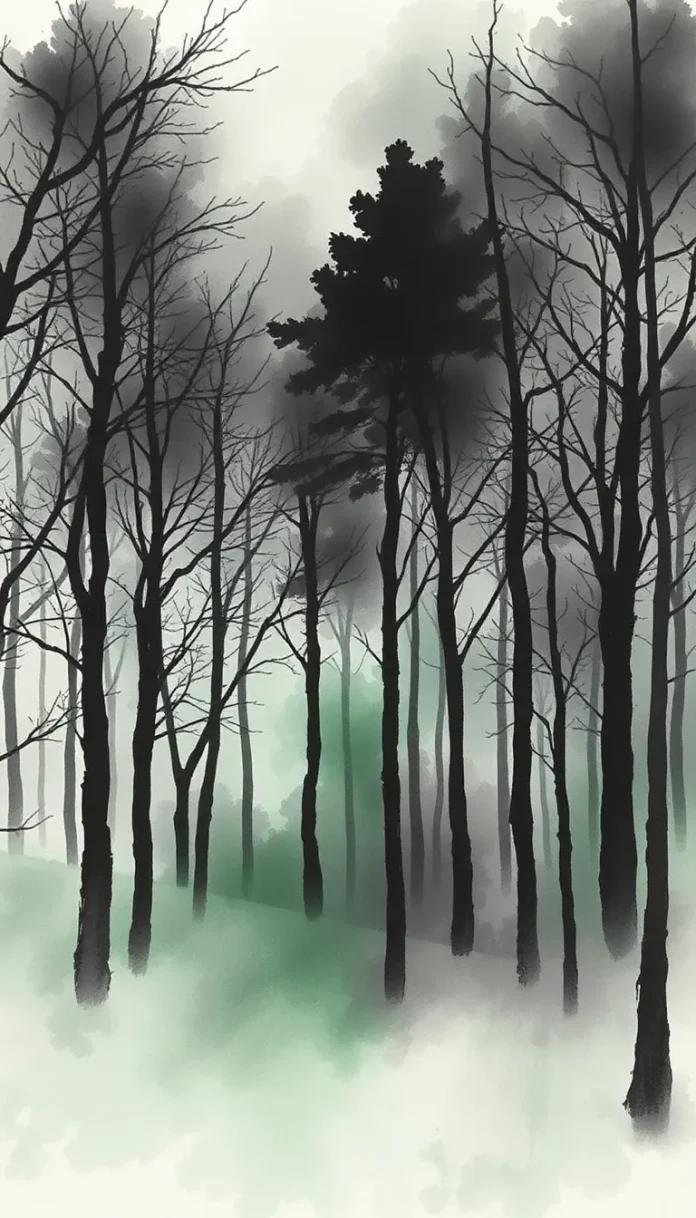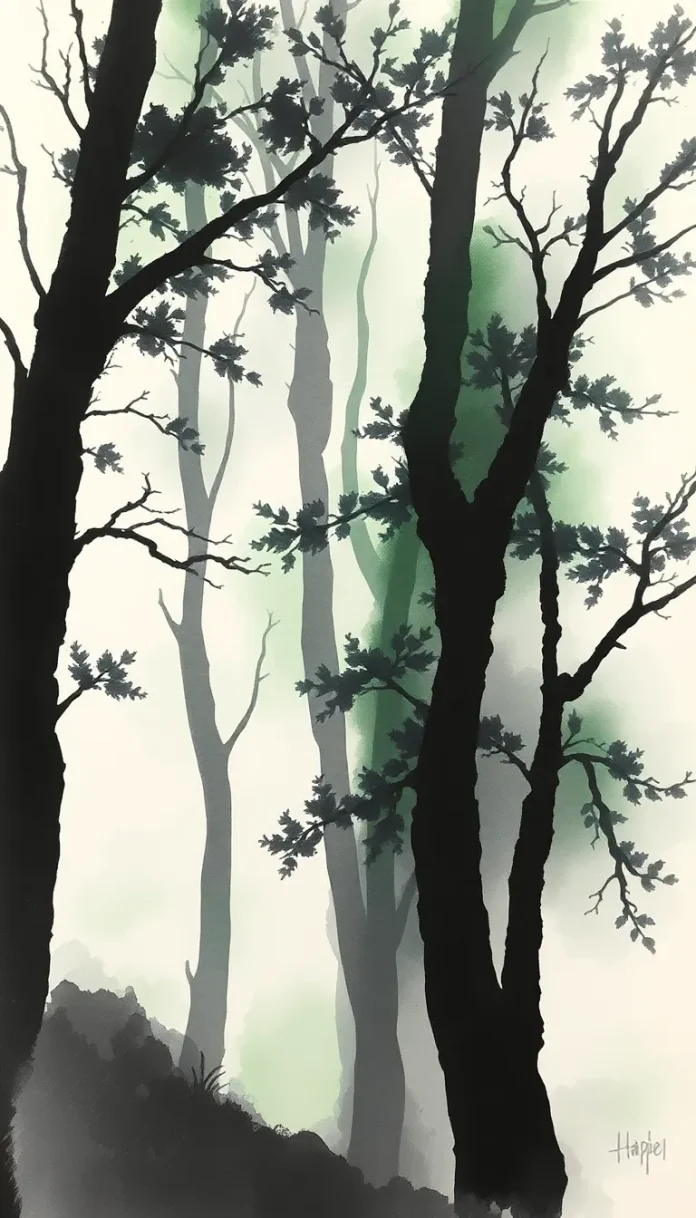Ode to the Tempest’s Lament
Where lightning danced with ancient stones in a waltz of sorrow,
There stood the old amphitheatre, its arches steeped in time
And echoes of forgotten verse that whispered of mortals’ plight.
Here, amid the shadowed ruins beneath the storm’s fierce cry,
Toiled the lone Poète en lutte contre le temps, a soul in constant strife,
Striving to capture fleeting moments with trembling hand
While Fate, relentless and unyielding, marked each step of his weary life.
The wind, a herald of regret, moaned through the shattered columns,
Carrying secrets of lost dreamers and memories steeped in woe;
And the poet, a ragged figure cloaked in despair and old regrets,
Stood pen in hand beneath the tempest’s watchful, sorrowful eye.
“Ah, Time,” he cried, voice trembling amid the furious gales,
“Thou art a specter, cruel and silent, whose passage none can stay;
Either I become thy willing servant with verses etched in sorrow,
Or like these ruins, crumble into the dust, forgotten in the dismay.”
The amphitheatre, an ancient battleground for hearts once filled with hope,
Now lay asunder under the onslaught of nature’s relentless mourning,
A sepulcher of laughter and love, where dreams had met a bittersweet demise,
And every stone recalled the humble notes of a brighter, bygone day.
Within this sanctum of despair, the poet traced his weary steps,
Recounting dialogues of old, conversations with a self forlorn,
Murmuring softly to the night: “What purpose doth this relentless fate serve?
Are we but pawns in an endless game, mere echoes of a tale long sworn?”
Thus began a journey through memory and despair—a narrative unsung,
Where every shattered column bore witness to a mortal’s frail condition,
And every fallen arch was a mirror reflecting the fleeting nature of hope,
A vivid allegory of life’s impermanence writ in the ink of ancient days.
The crackle of the storm overhead, the rumble of distant thunder,
Merged with the poet’s whispered and desolate refrain;
A cadence so delicate, yet imbued with the agony of existence,
That even Time, elusive tyrant, seemed to pause and weep in vain.
In those melancholic hours before the cloak of night had fully descended,
The poet recalled the days of youth—the golden sunlit hours of verity—
When dreams were spun like gossamer threads and the future shimmered bright,
A tapestry woven with the fragile hope of certain immortality.
Yet, as the tempest raged, the refrain of those halcyon visions grew faint,
Replaced by the verity of destiny’s relentless, unyielding march;
The tumult of existence now pressed upon him, relentless and cold,
Each tick of the eternal clock marking another step towards his fall from grace.
Beneath the vault of storm-wrought heavens, a dialogue, soft and forlorn,
Unfolded between the poet and the ancient stones that bore silent witness:
“Tell me, ye immortal stones, who once embraced the light,
Dost thou recall the laughter of men, the music of their hearts before night?
For in the storm’s lament, I hear a song of mingled joy and sorrow,
A memory of a time when hope’s delicate flame burned without fear of tomorrow.”
The stones, if they could speak, might have murmured a truth as bitter and fine
As the taste of rain upon parched lips—a legacy of lost loves, of dreams undone;
Yet in their mute response, the voice of Fate resonated through the hall,
A spectral chime echoing the inevitability of mortality in every crack and stone.
Thus, the poet understood that his struggle was eternal, a duel with the inexorable tide,
That each verse was but a brief reprieve from the consuming grasp of time,
That his art—though radiant in moments of sublime creation—was destined, like the ruins,
To succumb to the inevitable decay wrought by the march of fatal destiny.
He faltered beneath the weight of centuries, feeling the claws of destiny upon his heart,
For Time, that grim arbiter of all things mortal, had long decreed his doom;
Yet, still he penned each sorrowful line with a trembling hand and unwavering resolve,
An elegy to the transient beauty of life, a chronicle of despair and fleeting grace.
With every fallen tear and every beat of his anguished heart, he sought to defy
The cruel edict of inevitability, weaving verses rich with the hues of sorrow,
Yet the storm outside mirrored the sorrow within, a reminder that all glory fades,
And the ephemeral petals of human hope are destined to wither in Nature’s callow.
In the depth of the night, as rain cascaded like mournful verses upon ancient stone,
The poet found himself ensnared in an inner soliloquy, a battle waged in silence,
Where the whispers of his lost youth intertwined with the echo of forgotten dreams,
And each word he inscribed was a desperate plea against the unyielding current of fate.
“O Time,” he lamented, “thy grasp is endless, thy shadow ever darkening,
Yet I must labor, even if my soul withers like the autumn leaves before winter’s bite,
For in this struggle lies the very marrow of our fragile human state,
In defiance of the void, in a struggle that is the substance of our mortal plight.”
Thus marched the hours into an endless night, where light and hope did wane,
As the amphitheatre bore witness to the poet’s eternal contest—a solitary crusade
Against the devouring shadow of time, the ever-looming specter of disillusionment;
With each sonnet wrought in despair, the inevitability of fate grew ever more stark.
The wind bellowed out its ancient dirge, the storm’s fury a mirror to his pain,
And the old stones, guardians of countless bygone tales, seemed to weep with him.
Each flash of lightning, a sudden glimpse into a world of faded dreams,
Revealed in stark clarity the insurmountable chasm between mortal hope and the void.
Amid the ruin and debris of what once had been a triumphant bastion of art,
The poet encountered a solitary figure—a dusk-tinted silhouette amidst the rain,
A reflection of his own shadowed soul, emerging as if conjured by the storm’s lament;
“Art thou also a seeker of eternal truths, a wanderer bereft of lasting light?”
In a voice soft yet resonant, the figure replied, “In the echoes of these ancient halls,
I, too, have battled the relentless tide of time, my heart scarred by fate’s cruel hand.
We are alike, you and I, bound by the common thread of ephemeral existence,
Lost amidst the ruins of dreams, forever caught in the silent dance of despair.”
In that fleeting moment of correspondence—an interlude amidst the chaos of the storm—
The poet beheld in the companion a mirror of his own desolate condition;
For in the vulnerability of that brief exchange, the depths of human suffering lay bare,
A lamentation of souls adrift in the vast, indifferent theatre of time.
Yet, even as hope stirred like a faint, reluctant ember in their hearts,
Both knew that their union was transitory, a transient alignment of two forlorn fates;
For destiny, unyielding in its design, would soon pull them apart, leaving only echoes
In the hollow corridors of an ancient amphitheatre beneath a sky of tempestuous grey.
Thus, the poet resumed his solitary journey through the ruins of faded glory,
Each step a ballad to mortal frailty, each stanza a elegy to the doomed pursuit
Of capturing within ink the evanescent beauty of life—an art destined to shatter
Against the relentless hammer of time and the surging tide of inevitable decay.
As thunder rumbled in the distance like a heartbeat of a vast and sorrowful giant,
He penned a final sonnet, a desperate entreaty to the capricious fates that govern men:
“Let this verse be a testament to our ephemeral nature, a chronicle of our mortal shame;
For we, who dare to dream in the face of relentless time, are all but shadows in the rain.”
And so, beneath that storm-wracked sky, with the amphitheatre as his solemn stage,
The poet’s quill danced one final, fervent dance—a lamentation of the ephemeral,
An ode to the fatal rhythm of existence that binds our hearts in chains unseen.
There, amid the ruins and rainy whispers of long-forgotten splendor, he bled his art,
Each word a droplet of sorrow, each line a wisp of his lingering melancholy,
Till the final punctuation fell like a dying spark, a silent testament to despair;
For as the storm receded, leaving behind a desolation as deep as any wound,
The poet, enshrouded in the inevitability of his own fate, succumbed to his tragic end.
In the cold light of a dawn that offered no reprieve from the relentless hardship,
The amphitheatre stood in solemn witness to a life extinguished too soon,
A monument to human striving—a final chapter of a narrative too poignant for time.
No grand triumph awaited the weary soul, no resurrection of the dreams once fraught
With brilliance and despair; only the quiet dissolution of a spirit worn by the ceaseless march
Of destiny’s indifferent clock, whose hands had measured out every heartbeat, every tear.
In that final, sorrow-laden moment, the poet’s last verse dissolved into silence,
A note of tragedy that echoed through the ruined arches and vanished in the storm’s lament.
Thus ended the solitary passage of a man who sought to defy the grand design,
His struggle against the inexorable torrent of time rendered mute by fate’s decree,
A journey woven with the bittersweet threads of human condition and fatal inequity.
And in the ancient amphitheatre beneath a withdrawing tempest, the shadows gathered
To cradle his memory—a chronicle of unresolved yearning, an elegy of despair,
Etched forever in the damp, cold stone by the delicate hand of a soul undone.
For amidst the fall of rain and the ceaseless murmur of grief-laden winds,
The legacy of a poet’s desperate outcry remained—a testament to our timeless plight.
Oh, mourn, you silent ruins, for here lies the epitaph of mortal aspiration,
Carved in fleeting verses that danced like ephemeral fireflies in the gloom;
A reminder that even the most luminous dream is doomed to be scattered
By the relentless, unyielding currents of time—a fate as immutable as night itself.
So ends the tale of the Poète en lutte contre le temps, whose passion met its requiem
In a world that shows no mercy to the delicate art of embracing beauty in strife.
The storm withdraws, leaving only sorrow and the lingering specter of lost promise,
A tragic finale in the grand theatre of existence, written in the ink of quiet lament.
Now, in the lingering silence that follows the storm’s final outcry,
All that remains is the testament of a life woven with splendid agony—
A narrative of hope, defeat, and the unceasing struggle against what cannot be undone.
And as the light of a sorrowful dawn gradually unveils the broken majesty of the amphitheatre,
The poet’s legacy, inscribed upon the battered stones, stands as a solemn recitation
Of the wretched beauty inherent in the human soul’s perpetual, doomed embrace with time.
For every reader who treads these echoing corridors, may this lamented verse be a mirror—
Reflecting the eternal war waged within, where all hearts are bound by the threads of fate.
In the solitude of that final horizon—where memory and oblivion intertwine—
The eternal truth resounds: that even the brightest lyric is but a transient spark
Amid the vast, unyielding darkness of time. And though the verse now fades into the ether,
Its tragedy lingers as a poignant memoir, an ode to a spirit that dared to defy the inexorable.
Thus, with trembling resolve and a heart resigned to its inevitable demise,
The poet, whose life was a perpetual sonnet of melancholy and fleeting beauty,
Departed silently, leaving behind a requiem of words that weeps beneath the storm,
A sad, eternal elegy in an ancient amphitheatre beneath a sky forever marred by tears.


